
Why Iranians Believe That Officials are Liars, and not Honest
The editorial of Jahan Sanat discusses the lies told to the Iranian people by officials and how they have ruined people’s trust in them. In the most recent case, the IRGC downed a passenger flight and killed 176 people, but for three days, all Iranian officials lied about it.
Iranian government spokesperson Ali Rabiee said in a press conference: “We are accused of lying and secrecy, but that is not true.”
He and other officials must ask themselves why the public widely believes that they are liars and not honest. The answer to this question must be found in their own reactions, particularly in how they reacted to the recent case, and other previous cases.
They shouldn’t forget that society is sensitive to lies and that it is a part of Iranian culture. Perhaps, people themselves tell lies, but they will not accept blatant lies – especially if the lies affect national interests.
It must be noted that in today’s world, lying is not acceptable. In many countries, presidents and prime ministers resign for a simple lie. But even though such a serious incident took place in Iran, no one has resigned!
The government spokesperson, as well as military and non-military officials, denied the news related to this incident, arguing that the airplane crashed due to technical issues. People see such secrecy as dishonesty, and society will naturally react to it.
Lying has become the norm in Iran, and in other cases too, big lies have been told to the Iranian people. For example, we have not forgotten that in the case of nuclear scientists being assassinated, some were put on trial and their TV confessions were broadcast. But a few years later, it became clear that those arrested had nothing to do with these assassinations and it was just a fabrication. With regard to this issue, security and non-security officials, as well as Iranian state TV, told lies to the people.
As a result of the series of lies told to the people, society more readily believes that officials are lying. Such lies have destroyed people’s trust.
Is Qatar’s Emir Carrying a US Message for Iran?
The editorial of Arman Melli deals with the trip of Qatar’s Emir to Tehran suggesting that the visit aims to contain the growing tensions between Iran and America.
Nowadays there are serious efforts in the world to de-escalate tensions in the Middle East. This region cannot tolerate more tensions; any small or big incident can ignite a new war in the region.
In light of what happened recently, the visit of Mohammad bin Abulrahman bin al Thani, Qatar’s foreign minister, to Iran one day after the killing of Qassem Soleimani in Baghdad, and the recent trip of Qatar’s Emir to Tehran and his meeting with the Iranian president can be viewed in the context of the problems between Iran and the United States and controlling tensions in the region.
Naturally, issues regarding joint cooperation were raised, but the talks between Hassan Rouhani and Tamim bin Hamad al Thani centered on regional issues, the Iran-US relationship, and curbing tensions in the region. Regional countries seek to reduce tensions, as the consequences of a new war or even a limited military conflict in the Middle East will affect them.
As regional countries don’t want to be affected directly or indirectly by any possible conflict between Iran and America, they are trying to de-escalate tensions.
Soleimani’s assassination by the United States and Iran’s retaliatory measures have changed the situation in the region. What is now evident is that Iran and America have adopted a more suitable way to control tensions. Following the killing of Soleimani, both countries are trying to control tensions and go back to working within the framework of international law.
Neither America nor Iran want to worsen the situation as they do not want it to get out of control. Meanwhile, some mediators have tried to contain tensions between Iran and America, so that any possible confrontation does not result in an uncontrollable crisis in the region. The status quo is desirable for Trump; Iran too is not interested in engaging in a war with the United States.
Another Blow to Public Trust
The editorial of Ebtekar deals with how the news of the downing a Ukrainian plane was announced by Iranian officials and covered by Iran’s state media, the way it was handled was just another blow to public trust.
Human error is possible in any accident; even when an airplane is downed, it can be due to a human error. So disregarding how painful such an accident is, it is not impossible. But a human error becomes an unacceptable mistake when the way it is dealt with pushes public opinion towards anger and distrust.
Undoubtedly, when such an incident occurred, the cause should have been announced after thorough investigations. And if people were informed of the truth of the matter, perhaps the sadness resulting from this incident wouldn’t have deepened. As a matter of fact, officials denying and holding back the news of a missile striking the Ukrainian airplane weakened public trust in state officials. The government mishandling issues such as tripling the gasoline price and similar problems had already undermined public trust in state officials.
The other loser of this incident was the media whose authority was questioned. These media outlets must report facts in society; now they are conveying false news to the people because of unwise decisions by Iran’s officials.
The downing of the Ukrainian airplane and the way this crisis was handled by Iranian officials and media will impact future scenarios as they unfold as public trust has been damaged.
On the other hand, despite officials apologizing, such regret is only meaningful if done properly and at the right time. It must be noted that a succession of lies have been told to the Iranian public in recent months. People need honesty which will allow the media and society to deal with all issues comprehensively.
Officials Must be Present Where a Natural Disaster has Taken Place
The editorial of Afrinesh emphasizes that Iranian officials need to help the people harmed by natural disasters.
It has been a while since Iran has been engaged in domestic and international issues, and the country’s national interests mandate that officials should prioritize and deal with them. But meanwhile, Iran has been recently dealing with natural problems and disasters: earthquakes in Hormuzgan, Ilam, Khorasan provinces.
The earthquakes didn’t result in any fatalities, but they led to financial damage, including the destruction of homes requiring urgent repair before the onset of cold weather. In addition to the earthquakes, one should add the floods in Bandar Abbas and Qeshm Island that have created many problems for Iranians.
Running the country means officials who have accepted the responsibility of dealing with problems must be present at the site of natural disasters. But it has been a while since officials have honored this responsibility as problems caused by natural disasters are no longer a priority for Iranian officials.
Natural disasters have become so routine that we don’t even see them any longer. But they exist and create problems for the people.
Officials in provincial and municipal offices as well as the Red Crescent deal with problems resulting from natural disasters and try to help those affected as soon as possible and provide them with lodging, food, and clothes.
Some officials focus on political issues and international disputes that are not within their expertise while ignoring public wellbeing, peace and security.
Per news reports, Iranian officials deal with natural disasters, but during the past years, we have seen that efforts take place only in the immediate aftermath of the disaster, and the problems arising from natural disasters are later forgotten. Those who experienced earthquakes and floods two years ago are still living and studying in tents!

The Trigger Mechanism in the Nuclear Deal Activated
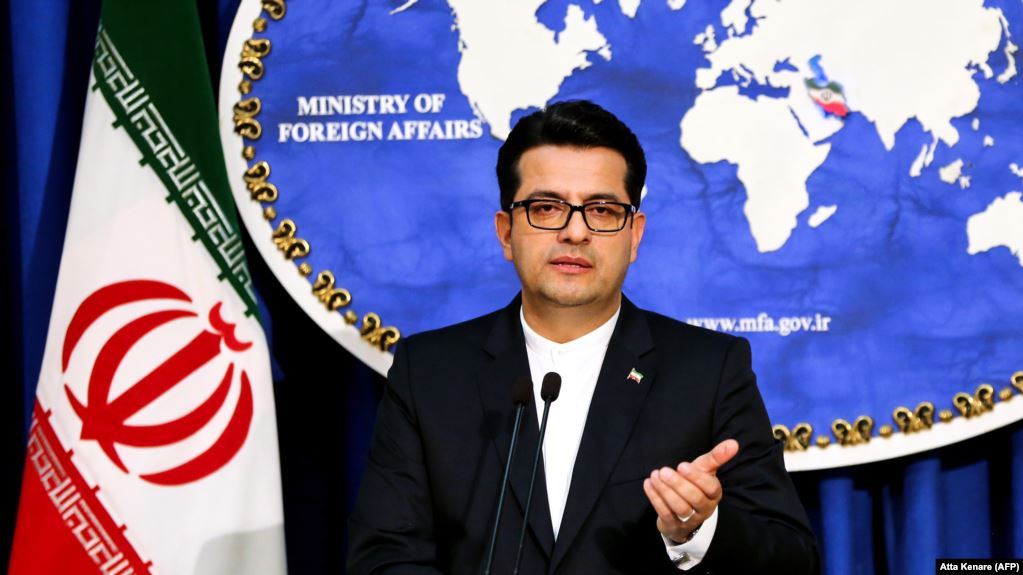
Britain, France, and Germany issued a statement on Tuesday announcing the activation of the mechanism for resolving disputes within the nuclear deal (JCPOA) – called the ‘trigger mechanism.’ The statement reads: “We have been left with no choice, given Iran’s reaction, but to register today our concerns that Iran is not meeting its commitments.”
These countries added that the nuclear issue is now referred to the joint commission for resolving disputes, in accordance with Paragraph 36 within the JCPOA.
This is the biggest measure taken by the Europeans in response to Iran reducing its nuclear commitments under the JCPOA. These countries, however, have said that this measure doesn’t mean joining the US maximum pressure campaign against Iran.
European Union Minister for Foreign Affairs Joseph Borrell has said that the European Union considers itself as still committed to the JCPOA, and will support any efforts by Iran to return to the deal.
The statement was issued 10 days after Iran took its fifth and final step in breaching its commitments under the JCPOA.
According to Paragraph 37 of the deal, the mechanism for resolving disputes can automatically activate all international sanctions against Iran. Europeans have warned Iran several times that if it persists in reducing its nuclear obligations, they will have to pull out of the nuclear deal.
Iran reacted to the statement by threatening that any ‘unconstructive’ measure in this regard will be responded to ‘seriously and decisively.’ Iran’s Foreign Ministry’s spokesman said in this regard that this measure is completely passive and taken from a ‘weak position.’
Along with recent tensions between the Islamic Republic and the United States, the US administration put sanctions on the steel industry and some of the Islamic Republic’s officials, following the IRGC’s attack on two US bases in Iraq.
Karroubi: Khamenei is not Qualified for Leadership Reza Pahlavi: Downing the Passenger Plane is a Crime Against Humanity
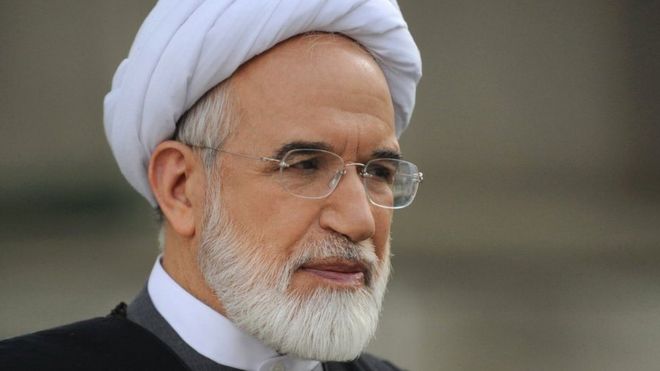
An IRGC missile downing a Ukrainian passenger plane and officials failing to take responsibility for it provoked harsh reaction against the Iranian Supreme Leader Ali Khamenei.
Mehdi Karroubi, one of the leaders of the protests in 2008, wrote a letter to Ali Khamenei, saying either he was aware of the downing of the Ukrainian flight and had allowed the Iranian people to be deceived, or was unaware; in both cases, Khamenei doesn’t have the qualifications to lead the people.
Karroubi wrote that Khamenei as “commander-in-chief” has direct responsibility in this regard.
For three days Iranian officials did not announce that the Ukrainian flight was downed by a missile fired by the IRGC, blaming it on technical problems.
Karroubi blames Khamenei for other ‘scandals’ during his leadership, saying the supreme leader is responsible for not investigating the issue of the chain murders, rigged elections and the violent suppression of protests in 2009, and 2017, and finally not investigating the suppression of protesters in 2019 who protested against the price of gasoline being tripled.
Karroubi has been under house arrest since 2011, almost a decade, as he contested the results of the presidential elections in 2009. He believes that they were rigged.
Meanwhile, exiled Prince Reza Pahlavi also reacted strongly to the downing of the Ukrainian passenger plane by an IRGC missile, calling it not a human error, but a crime against humanity.
In a tweet in this regard, Reza Pahlavi said: “This is not human error; it is a crime against humanity. And the leader who gives the order of ‘fire at will’ is directly responsible for it. Enough is enough. Khamenei and his regime must go.”
At the same time, in an audio file, Faezeh Hashemi too called for the resignation of Ali Khamenei, while asking people to keep protesting against the government in Iran.
Faezeh Hashemi, daughter of the late Akbar Hashemi Rafsanjani, has strongly criticized the way the country is run calling for the resignation of Iran’s supreme leader.
Iranian Lawmakers Back the IRGC After Downing the Ukrainian Flight
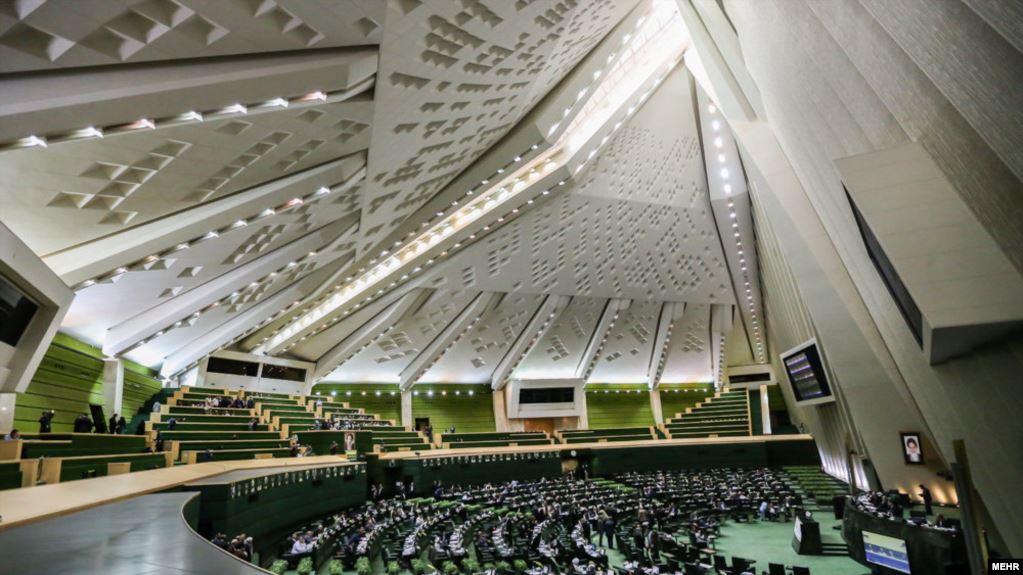
In a statement, Iranian lawmakers announced that downing the Ukrainian passenger jet by an IRGC missile was a “mistake made by a family member” and they won’t allow “the enemies to take advantage of this issue.”
In a statement signed by 186 lawmakers, the IRGC’s missile strikes against the US bases in Iraq were extensively praised. The lawmakers have also thanked the IRGC for admitting to shooting down the airplane, commending the IRGC and its commander for their “full honesty” in this regard.
Meanwhile, Ali Khamenei’s representative in the IRGC’s Quds Force, Ali Shirazi, reacted to a new wave of anti-establishment protests in Iran by threatening the protesters and blaming the protests on America and Israel.
Following the official confirmation of the downing of the Ukrainian airliner with an IRGC’s air defense missile and killing 176 people, a new wave of protests have been sparked in Tehran and other cities of Iran against secrecy and deception by the Islamic Republic’s officials.
Pointing to the IRGC’s downing of the Ukrainian passenger flight, Shirazi said: “We will not allow the enemies of our nation – imperialistic America, Zionist regime, and their pawns – to take vengeance on Iranian people under the pretext of shooting down the airplane.” He added that the Iranian people will not turn their back on the IRGC for “one mistake.”
The protesters have been chanting slogans against Khamenei, the Islamic Republic, and the IRGC. Again and again the Islamic Republic’s officials have cracked down on peaceful protests under the pretext of providing security.
Rouhani: Iran and Qatar to Form a Joint Committee
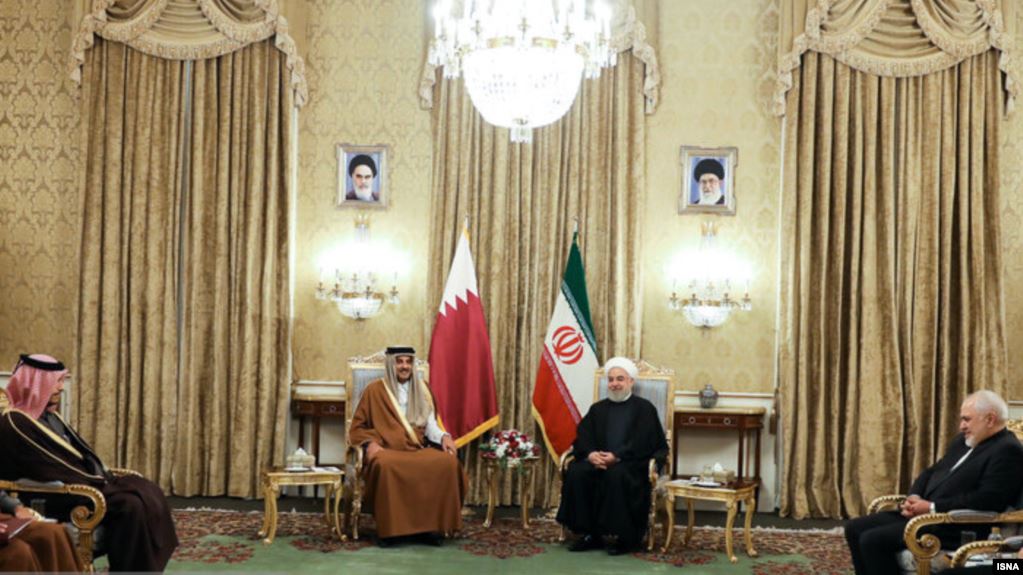
Iranian President Hassan Rouhani announced the formation of an annual joint committee with Qatar. In a joint press conference with Tamim bin Hamad al Thani, Qatar’s Emir, Rouhani said that this committee’s activities will include economic, scientific and cultural relations.
The Iranian president also announced increasing consultation between the two countries regarding security in the Gulf, the Strait of Hormuz, and the Sea of Oman.
Qatar’s Emir too talked of growing cooperation between the two countries in tourism and trade, emphasizing that when Qatar was under “siege,” Iran provided many facilities for the country and “some services cannot be forgotten.” He also asserted that his trip is at a very “sensitive time,” stressing that dialogue is the only way to resolve disputes in the region.
Earlier, there were reports regarding Qatar’s Emir possibly mediating between Iran and America.
Qatar has good relations with both Iran and America and has encouraged both countries to negotiate to lessen the tensions in the region.
Floods hit Sistan and Baluchistan; Hundreds of Villages Under Water or Surrounded by Flood Water
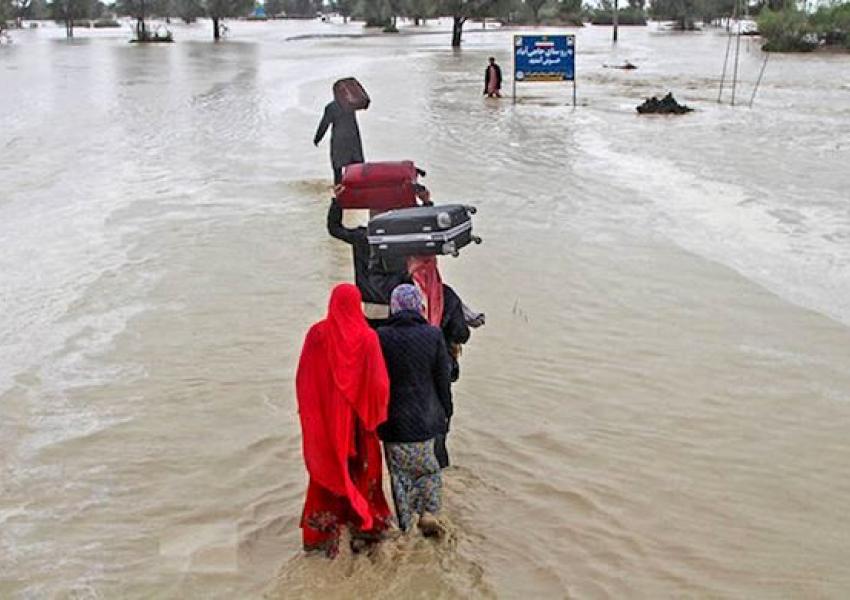
Following the devastating floods in Sistan and Baluchistan province, eastern Iran, hundreds of villages still suffer from a shortage of water, lack of electricity, disconnection from roads, and telephone outages.
Several villages are under water and there is no road connection to some of them, which has turned them into islands surrounded by water.
More than 20,000 people in the villages of this province have completely lost their homes. And in recent days, the water for 245 villages was cut off.
The areas hit by floods are facing a shortage of medicine, and people are now in danger of catching the flu due to the cold weather.
So far, three people have been killed due to the recent floods in the provinces of Sistan and Baluchistan, Hormuzgan, and Kerman.
